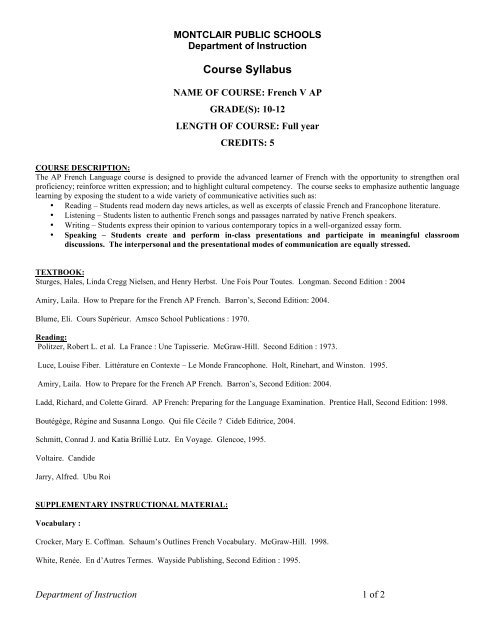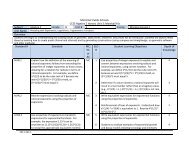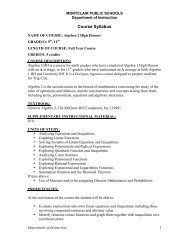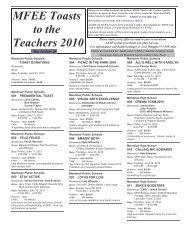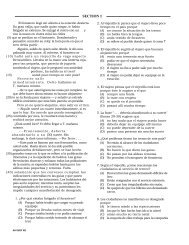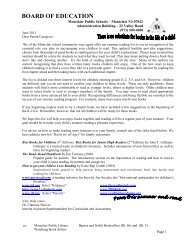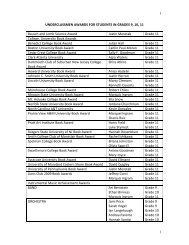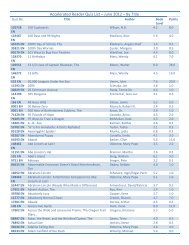2011-2012 Syllabus - French V AP
2011-2012 Syllabus - French V AP
2011-2012 Syllabus - French V AP
Create successful ePaper yourself
Turn your PDF publications into a flip-book with our unique Google optimized e-Paper software.
MONTCLAIR PUBLIC SCHOOLS<br />
Department of Instruction<br />
Course <strong>Syllabus</strong><br />
NAME OF COURSE: <strong>French</strong> V <strong>AP</strong><br />
GRADE(S): 10-12<br />
LENGTH OF COURSE: Full year<br />
CREDITS: 5<br />
COURSE DESCRIPTION:<br />
The <strong>AP</strong> <strong>French</strong> Language course is designed to provide the advanced learner of <strong>French</strong> with the opportunity to strengthen oral<br />
proficiency; reinforce written expression; and to highlight cultural competency. The course seeks to emphasize authentic language<br />
learning by exposing the student to a wide variety of communicative activities such as:<br />
• Reading – Students read modern day news articles, as well as excerpts of classic <strong>French</strong> and Francophone literature.<br />
• Listening – Students listen to authentic <strong>French</strong> songs and passages narrated by native <strong>French</strong> speakers.<br />
• Writing – Students express their opinion to various contemporary topics in a well-organized essay form.<br />
• Speaking – Students create and perform in-class presentations and participate in meaningful classroom<br />
discussions. The interpersonal and the presentational modes of communication are equally stressed.<br />
TEXTBOOK:<br />
Sturges, Hales, Linda Cregg Nielsen, and Henry Herbst. Une Fois Pour Toutes. Longman. Second Edition : 2004<br />
Amiry, Laila. How to Prepare for the <strong>French</strong> <strong>AP</strong> <strong>French</strong>. Barron’s, Second Edition: 2004.<br />
Blume, Eli. Cours Supérieur. Amsco School Publications : 1970.<br />
Reading:<br />
Politzer, Robert L. et al. La France : Une Tapisserie. McGraw-Hill. Second Edition : 1973.<br />
Luce, Louise Fiber. Littérature en Contexte – Le Monde Francophone. Holt, Rinehart, and Winston. 1995.<br />
Amiry, Laila. How to Prepare for the <strong>French</strong> <strong>AP</strong> <strong>French</strong>. Barron’s, Second Edition: 2004.<br />
Ladd, Richard, and Colette Girard. <strong>AP</strong> <strong>French</strong>: Preparing for the Language Examination. Prentice Hall, Second Edition: 1998.<br />
Boutégège, Régine and Susanna Longo. Qui file Cécile ? Cideb Editrice, 2004.<br />
Schmitt, Conrad J. and Katia Brillié Lutz. En Voyage. Glencoe, 1995.<br />
Voltaire. Candide<br />
Jarry, Alfred. Ubu Roi<br />
SUPPLEMENTARY INSTRUCTIONAL MATERIAL:<br />
Vocabulary :<br />
Crocker, Mary E. Coffman. Schaum’s Outlines <strong>French</strong> Vocabulary. McGraw-Hill. 1998.<br />
White, Renée. En d’Autres Termes. Wayside Publishing, Second Edition : 1995.<br />
Department of Instruction 1 of 2
Listening :<br />
MONTCLAIR PUBLIC SCHOOLS<br />
Department of Instruction<br />
Course <strong>Syllabus</strong><br />
Amiry, Laila. How to Prepare for the <strong>French</strong> <strong>AP</strong> <strong>French</strong>. Barron’s, Second Edition: 2004.<br />
Boutégège, Régine and Susanna Longo. Qui file Cécile ? Cideb Editrice, 2004.<br />
Luce, Louise Fiber. Littérature en Contexte – Le Monde Francophone. Holt, Rinehart, and Winston. 1995.<br />
UNITS OF STUDY:<br />
eptember<br />
Grammar: Review of Present Tense (regular and irregular verbs), Futur Proche, and the gender of nouns. (Une fois pour<br />
toutes)<br />
Oral: Paired picture sequence prompt activity. (Advanced Placement <strong>French</strong>)<br />
Aural: Listening exercises. (<strong>AP</strong> <strong>French</strong>)<br />
Reading: Jarry – Ubu Roi – Le théâtre symboliste<br />
Ionesco - L’Agence de voyage – extrait (Abord)<br />
<strong>AP</strong> Exam – Selected passages from older tests.<br />
Assessment: Rédaction – Les Traditions dans votre famille.<br />
Le Répondeur – oral quiz over the phone.<br />
Grammar test<br />
Reading quiz<br />
Listening quiz [<br />
October<br />
Grammar: Review of the Passé Composé (Avoir & Être), Direct Object Agreement in the Passé Composé, Review of the<br />
Imparfait, the Interrogative and its pronouns, and idiomatic expressions relating to animals. (Une fois pour<br />
toutes, En d’autres termes)<br />
Oral: Students create skits using the selected vocabulary from the idiomatic vocabulary list.<br />
Aural: Listening exercises. (<strong>AP</strong> <strong>French</strong>)<br />
Reading: Jean-Paul Sartre – La Nausée – extrait (En Voyage)<br />
Tahar Ben Jelloun – La Réclusion Solitaire – extrait (En Voyage)<br />
Assessment: Rédaction – Les Voyages<br />
Grammar test<br />
Reading quiz<br />
Presentation – Oral Grade and Writing Grade<br />
Listening Quiz<br />
Picture Prompt quiz<br />
November<br />
Grammar: Review of Passé Simple (Amsco Cours Supérieur)<br />
Oral: In-class discussions on Candide – question and answer format.<br />
Vocabulary Project – « Mot de Passe. »<br />
Reading : Voltaire – Candide.<br />
Assessment : Written test on Candide.<br />
Oral Vocabulary Test on Candide – « Mot de Passe. »<br />
December<br />
Grammar: Review the Futur. (Une fois pour toutes)<br />
Oral: Paired role play activity based on the reading’s scenarios.<br />
Department of Instruction 2 of 2
MONTCLAIR PUBLIC SCHOOLS<br />
Department of Instruction<br />
Course <strong>Syllabus</strong><br />
Aural: Listen to <strong>French</strong> songs. (Liane Foley – Rêve Orange and<br />
Disney’s Sing-a-Long)<br />
Reading: Voltaire – Candide.<br />
Assessment: Written test on Candide.<br />
Listening quiz on Candide<br />
Presentation – Original Script based on Candide’s characters - both oral and written<br />
grades.<br />
Picture Prompt quiz<br />
January<br />
Grammar: Review the Conditional; all previously studied tenses for the Mid-Term, idiomatic expressions relating to the<br />
body, and television / weather vocabulary. (Une fois pour toutes, Schaum’s <strong>French</strong> Vocabulary, En d’autres<br />
termes)<br />
Oral: Student led discussions on their favorite television shows and movies. Question and answer sessions on the<br />
readings.<br />
Aural: Listening activity – Chapter One - Qui file Cécile?<br />
Reading: Sacha Guitry – La Dactylo (La France: Une Tapisserie)<br />
Romain Rolland - L’Enfant Solitaire (La France: Une Tapisserie)<br />
Assessment: Reading quiz<br />
Listening quiz<br />
Oral quiz – La Météo<br />
Mid-Term – Written grammar component, reading component, and oral component.<br />
February<br />
Grammar: Continue with the Conditional and “Si” Clauses. (Une fois pour toutes)<br />
Oral: In-class discussion on the reading and relate La Négritude to<br />
the chapter on slavery in Candide – Le Code Noir.<br />
Aural : Listening Activities – Chapter Two and Three – Qui file Cécile?<br />
Poetry Narration: Michèle Lalonde - Speak White<br />
Reading: La Francophonie – La Côte d’Ivoire – La Négritude<br />
Bernard Dadié – La Cruche (La France: Une Tapisserie)<br />
Michèle Lalonde – Speak White. (Littératures En Contextes)<br />
Assessment : Rédaction – Le But de la Négritude<br />
Written test on La Cruche.<br />
Le Répondeur – Oral test over the phone.<br />
March<br />
Grammar : Review the Subjunctive ; its structure ; with expressions of volition; with impersonal expressions; with<br />
negation; and with conjunctions. Do work on “Verb Fill-In” series. Vocabulary on Household Electronics,<br />
Chores, and Proverbs. (Une fois pour toutes, Amsco Cours Supérieur, <strong>AP</strong> <strong>French</strong>, Schaum’s <strong>French</strong><br />
Vocabulary, and En d’autres termes.)<br />
Oral: Paired picture sequence prompt activity. (Advanced Placement <strong>French</strong>)<br />
Aural: Listening Activities – Chapter Four and Five – Qui file Cécile?<br />
Reading: André Maurois – La Maison (La France: Une Tapisserie)<br />
Romain Gary - La Promesse de l’aube – extrait (La France: Une Tapisserie)<br />
<strong>AP</strong> reading strategies (<strong>AP</strong> <strong>French</strong>)<br />
Assessment : Rédaction - Le rôle de la bibliothèque dans votre école.<br />
Written test on Subjunctive.<br />
Written quiz on Subjunctive.<br />
Department of Instruction 3 of 2
April<br />
Reading Quiz<br />
MONTCLAIR PUBLIC SCHOOLS<br />
Department of Instruction<br />
Course <strong>Syllabus</strong><br />
Grammar: Review Prepositions. Work on “Function Words” series. Continue on Verb “Fill-In” series. Vocabulary work<br />
on Nature and Environment. (Une fois pour toutes, Advanced <strong>French</strong> Placement, <strong>AP</strong> <strong>French</strong>)<br />
Oral: Individual picture sequence work.<br />
In-class discussion of the environment.<br />
In-class discussion of film – Au revoir, les enfants<br />
Aural: View the film – Au revoir, les enfants.<br />
Reading: Jacques Prévert – Le Dromadaire Mécontent. (La France: Une Tapisserie)<br />
Environmental Article<br />
Assessment : Rédaction – L’Honnêteté<br />
Listening quiz<br />
Reading quiz<br />
Picture Prompt quiz<br />
Practice <strong>AP</strong> Exam<br />
May<br />
Grammar: Continued practice work of the <strong>AP</strong> Exam; verb fill-in<br />
activities and function word activities. (<strong>AP</strong> <strong>French</strong>)<br />
Oral: Individual picture sequence recordings.<br />
Aural: Listening Activities – Chapters Six, Seven, and Eight – Qui file Cécile?<br />
Reading: Ionesco – La leçon –<br />
PROFICIENCIES:At the completion of the course, students will be able to:<br />
1. Take the <strong>French</strong> Language Advanced Placement Exam<br />
2. Confidently participate in a class conducted in <strong>French</strong><br />
3. Understand Francophone speakers through the use of audio tapes and CD’s , films, TV shows, songs, and guest speakers<br />
4. Demonstrate oral communicative skills through activities such as: spontaneous skits, simulated conversations, formal oral<br />
presentations which synthesize information from two sources – a reading and an audio<br />
5. Analyze the themes and cultural significance of literary works from the various nations of the Francophone world<br />
6. Speak and write <strong>French</strong> accurately using advanced grammar structures and idiomatic expressions<br />
7. Make connections to other subject areas through reading selected passages<br />
FIELD TRIPS & GUEST SPEAKERS: Field trips and speakers will be applicable to content and will be determined by the<br />
instructor. The following are suggested field trips and speakers:<br />
1. Metropolitan Museum<br />
2. The Cloisters<br />
3. <strong>French</strong> restaurants<br />
EVALUATION AND ASSESSMENT: Description and method of evaluation for each component noted below.<br />
1. Essays: Essays will be assigned once per month. Each essay will be worth a test grade.<br />
2. Class performance: Is an assessment of oral work and participation. Students must demonstrate understanding of the<br />
literary works read and their themes. Oral works, such as current events, will be an integral part of the class performance<br />
grade. Students must show a high proficiency of the Spanish Language through oral participation.<br />
Department of Instruction 4 of 2
MONTCLAIR PUBLIC SCHOOLS<br />
Department of Instruction<br />
Course <strong>Syllabus</strong><br />
3. Tests and Quizzes: Tests will be administered on specific material at the end of a thematic unit or chapter. They may be<br />
written or oral. Quizzes are evaluations of short-term knowledge and understanding of the works. Quizzes usually are of<br />
a oral, aural, or written format.<br />
4. Homework: Allows students to implement and emphasize their understanding and knowledge of the content and skills<br />
taught in class. Homework will be assigned on a daily basis. Also, long-term assignments will be given and students<br />
should plan accordingly.<br />
Marking Period Grade:<br />
Class performance and homework: 35%<br />
Quizzes: 35%<br />
Tests: 30%<br />
NEW JERSEY CORE CURRICULUM CONTENT STANDARD ALIGNMENT: 7.1 World Languages All students will be<br />
able to use a world language in addition to English to engage in meaningful conversation, to understand and interpret spoken and<br />
written language, and to present information, concepts, and ideas, while also gaining an understanding of the perspectives of other<br />
cultures. Through language study, they will make connections with other content areas, compare the language and culture studied<br />
with their own, and participate in home and global communities.<br />
Department of Instruction 5 of 2


